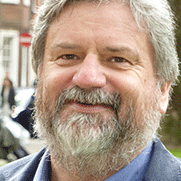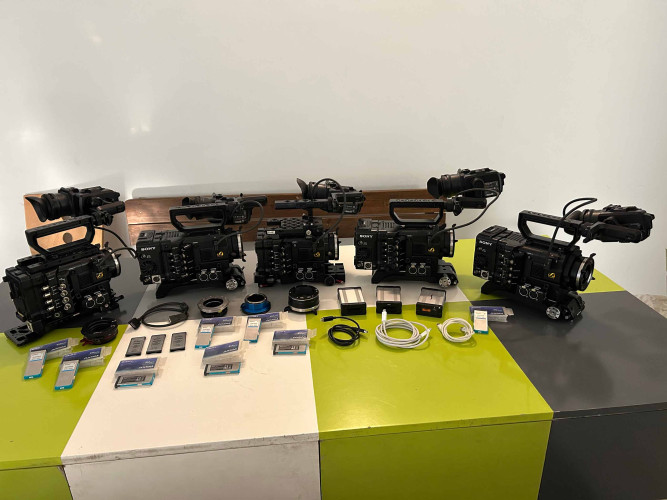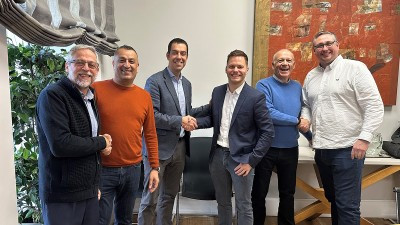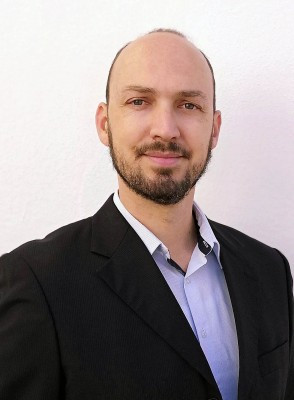by Dick Hobbs
Issue 79 - July 2013 I have a new hero. His name is Dr Brij Kothari. Hes the guy on the left of the picture. Yes, I know that his achievements will be well known to many of you, but I have just discovered his impact so humour me and let me tell you about him.
Kothari was born in Nanded in India, in 1964. His parents encouraged his academic interests, and after a first degree in his home country he won a place at Cornell in the States for a doctorate in linguistics. As part of his studies he set out to learn Spanish.
He found local independent cinemas in the area showing films from Spain, but they were always screened with English subtitles and, as hard as he tried, he could not ignore the words on the screen. We have all experienced the same phenomenon. If we see a subtitled television in a noisy environment like a railway station (or a bar), the captions become hypnotic: we cannot stop reading them.
Reading words in English was not helping Kothari improve his colloquial Spanish, though. Because he was a PhD candidate and thus capable of clear thought, he reasoned that it would work if the captions were in Spanish, reinforcing the sounds.
His initial thought was that reading the words would help him learn the sounds of the language. The real jump in logic came when he considered whether it would work the other way around: if you were familiar with the sounds of the language, would seeing the words on screen help with reading?
And yes, it turned out that it would. So a trend now known as samelanguage subtitling (SLS) was born. His first experiment, in 1999, was a Gujarati show called Chitrageet, and in 2002 Doordarshan, the Indian national broadcaster, started subtitling the national programme Chitrahaar. The subtitling was promoted as part of a concerted effort to boost literacy.
Subtitles on any content helps to associate the written word with spoken language, but another important discovery is that it works really well with songs. They have built-in repetition which reinforces the learning, the language is relatively simple and easy to learn, and most important it is content that people actively want to watch. Today one of the most effective uses of SLS in India is a Sunday night singalong. Vast audiences over 200 million viewers a week join in this karaoke-for-literacy. Not only are they learning as they go, researchers have found that young people like to copy down the words so they can sing the songs with friends later. It seems like a perfect solution: you learn while having fun.
This approach obviously cannot teach reading from scratch. You have to have some idea of what the shapes mean, so you need to learn the basics of the alphabet. But a surprising number of people master this yet fail to move on to what scientists call functional literacy, the state of being able to read real content, of being comfortable with written material.
Given that caveat, it certainly seems to work. Functional literacy in the areas covered by the SLS project has more than doubled. A researcher focussing on a typical town Khodi in Gujarat found that the reading of newspapers has risen by more than 50%. And that is where it starts to be important.
A population that is not comfortable reading newspapers is ill-informed to take any part in democracy. Boosting functional literacy is good for the basic fundamentals of a fair society. So, too, is the ability to read a bus timetable, for example. It means people are more mobile so can get to jobs and to social gatherings.
Which is incredibly important in rapidly developing countries like India. But functional literacy is a challenge right across the world. According to the World Literacy Foundation, one in five adults in the UK struggles with basic reading. Three out of five Americans in jail cannot read. There could be as many as 50 million functionally illiterate citizens of the USA.
So this really is a global problem. Being well informed is as critical a step in taking your place in society in the richest countries of the west as it is anywhere else. And Dr Kotharis solution seems to me to be so simple.
We already have same-language subtitles prepared for a lot of our television content. We provide it for those who have impaired hearing. Providing it for all content for all the songs on all the MTV channels, for instance would be a relatively trivial exercise.
Couple it with a campaign so that those who would most benefit are encouraged to turn the subtitles on. That needs a bit of imagination: telling people that if they sing along to Daft Punk they will be able to read the Times Literary Supplement next week is probably not going to be the best approach.
But it has got to be worth a try. It would be good if the unsung heroes of the subtitling industry get recognised for helping a worthwhile social advance.
Good words from Dick Hobbs

Author: Dick Hobbs.
Published 1st August 2013





























